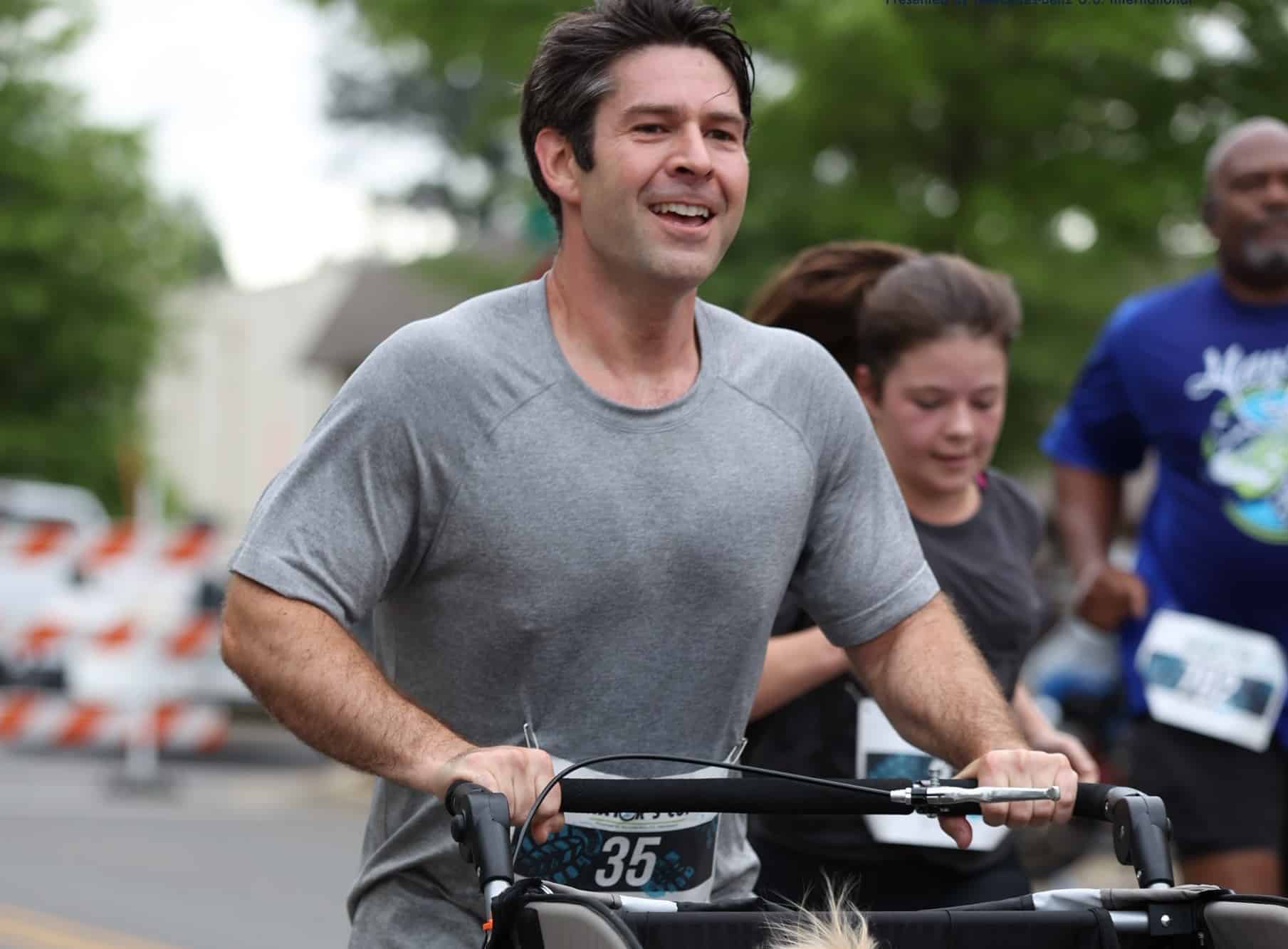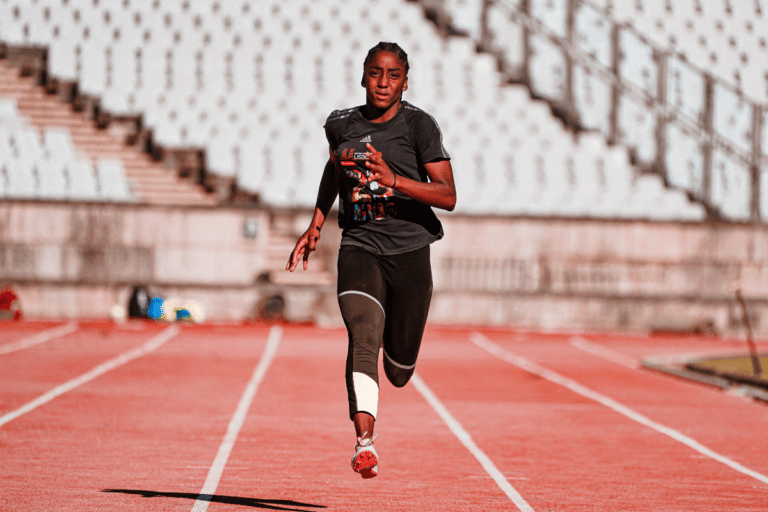Is Sub 2 Hours Good for a Half Marathon? (Average Times By Age)
Whether you plan to run your first half marathon or simply want to gauge your current times, you may be looking for a reference point. Is less than two hours a good time for a half marathon?
A sub-2-hour half marathon is a good time for most runners. The average half marathon time for men of all ages is around 1:43:00-1:55:00. For women, the average time increases to 2:00:00-2:05:00. While the current world record time is 57:31, set by Ugandan Jacob Kiplimo, most non-professional runners would be pleased with a time under 2 hours.
Looking for more information? Read on for a detailed discussion on half marathon times.
Is under 2 hours a good time for a half marathon finish?
If you’re training for your first half marathon, you’re probably trying to gauge exactly what you should be aiming for. Is less than two hours to run 13.1 miles a good showing?
A sub-2-hour half marathon is a quality time for a semi-experienced runner. Reported average times for men across all ages seem to land somewhere between 1:43:00 and 1:55:00, while reported average times for women of the same spectrum fall between 2:00:00 and 2:05:00.
Of course, most runners who are well below average may not be reporting their times, so the figures could be skewed a bit in favor of faster times, but the 2-hour barometer seems to be somewhat of a safe reference point.
Running is a sport that allows you to compete with yourself just as much as with other competitors so a “good half marathon time” for one runner may be average, or even poor, for others. However, when compared to average reported times, a sub-2-hour half marathon is quite strong. It seems that many runners use the 2-hour mark as a barometer of success when it comes to running half marathons.
2-hour half marathon pace in km/h
To run a sub-2-hour half marathon, you must maintain a pace of 5:51 minutes/km.
2-hour half marathon pace in mph
To run a sub-2-hour half marathon, you must maintain a pace of 9:10 minutes/mile.
What is a respectable time for a half marathon?
When entering a half marathon, you’ve probably got one of two goals. Either your goal is simply to finish the race, proving you can do it, or you want to do well. While finishing is always something to be proud of, what’s considered a “respectable time” for a half marathon?
A good time for a half marathon depends on several factors, including age range and ability level. A man in reasonable shape, in the 15-40 age range, can be proud of any sub-2-hour half marathon time. However, a time of 2:30:00 could be considered respectable for someone who finds themselves with a different set of variables.
Your age, current level of fitness, and length of training can all impact your performance. Therefore, determining a respectable time will not likely be a black-and-white issue.
The important thing is that you continue to improve as an individual. When choosing to shoot for a specific time, you will always want to take into account your previous times, and select time goals that will stretch you realistically in your age range and ability level. Don’t try to break the world record on your first-ever half marathon. Instead, focus on personal wins and win small victories first.
4 factors that determine your half-marathon time
As mentioned above, there are a number of factors to consider when discussing half-marathon times. Of these, there are a number of “X-factors” that will likely lead to improved times.
Your half-marathon time will be determined by your:
- Age
- Body weight
- Previous marathon/training experience
- Athleticism
Let’s dive into each of these factors and see how they can affect your overall time.
Age
While the average age of half-marathon runners has increased in recent years, there still seems to be an optimal age range for peak performance.
Age – particularly youth – is a critical factor in half-marathon times. Between the ages of 20 and 35, reported times are lowest among runners of various experience levels.
On the flip side, runners above the age of 40 begin to see a steep performance decline.
Body weight
Higher performance is critically linked to higher body density and lower body fat meaning body weight can directly affect your time when running a half marathon.
Maintaining low body weight is crucial for long-distance running performance due to the fact that each additional pound of weight that a runner carries requires an additional pound of force that they must exert with each step.
Therefore, the optimal body type will be low in fat and relatively high in muscle.
Previous marathon/training experience
Another “X-factor” has to do with training and experience.
As you would expect, training for a half-marathon, and having previous half-marathon experience positively correlate with improved times.
Running 13.1 miles is a difficult thing to do if you haven’t prepared for it beforehand.
Athleticism
While running doesn’t require additional athletic experience, having an athletic background will likely have produced the certain physique and cardiovascular capability necessary to find success in half-marathon running.
Non-athletes will find it challenging to build the fitness level necessary to complete 13.1 miles by simply running alone. Cross-training in other sports is a great way to build up your overall fitness levels. This will often have an immediate impact on running performance.
Average half-marathon time for beginners
The half-marathon can be a grueling race for first-time runners. Absolute beginners obviously have the worst average times of any other sub-category of runners.
Below you can find a table detailing the average race times for beginner marathoners.
Male Half Marathoners
Overall, males tend to post faster times than their female counterparts. The average first marathon times of men ages 20 to 30 are virtually indistinguishable, then start rising with age.
| Age | Time |
|---|---|
| 15 | 02:30:06 |
| 20 | 02:24:57 |
| 25 | 02:24:57 |
| 30 | 02:24:57 |
| 35 | 02:25:45 |
| 40 | 02:29:29 |
| 45 | 02:35:40 |
| 50 | 02:42:27 |
| 55 | 02:49:52 |
| 60 | 02:57:59 |
While less than two hours is a good goal when running a half marathon, it’s clear that it’ll take a lot of work to get there on your first try.
Female Half Marathoners
Like their male counterparts, female beginners post their best times between the ages of 25 and 35.
It’s worth noting that women’s averages tend to be a bit slower than the male’s numbers.
| Age | Time |
|---|---|
| 15 | 02:58:13 |
| 20 | 02:44:13 |
| 25 | 02:42:58 |
| 30 | 02:43:01 |
| 35 | 02:44:33 |
| 40 | 02:48:23 |
| 45 | 02:54:51 |
| 50 | 03:04:28 |
| 55 | 03:16:00 |
| 60 | 03:29:05 |
How fast are world record half marathoners?
The overall world record for a half-marathon is held by Jacob Kiplimo of Uganda. He ran a time of 57:31 in 2021 to break the previous record. Below you will find two tables of half-marathon World Record holders at various age levels, subdivided by sex.
Men’s WR Holders
| Age | Time |
|---|---|
| 15 | 01:00:05 |
| 20 | 58:01 |
| 25 | 58:01 |
| 30 | 58:01 |
| 35 | 58:20 |
| 40 | 59:50 |
| 45 | 01:02:19 |
| 50 | 01:05:01 |
| 55 | 01:07:59 |
| 60 | 01:11:14 |
Women’s WR Holders
| 15 | 01:10:33 |
| 20 | 01:05:01 |
| 25 | 01:04:31 |
| 30 | 01:04:32 |
| 35 | 01:05:08 |
| 40 | 01:06:39 |
| 45 | 01:09:13 |
| 50 | 01:13:01 |
| 55 | 01:17:35 |
| 60 | 01:22:46 |
Good half marathon times by age and gender
When it comes to running times, determining a quality result will depend on a number of variables such as age, health/fitness level, sex, and experience.
Below, you will find a table of average times for various sex and age categories determined by a computer-based calculator. The data has been collected from publically available internet sources, and thus represents a realistic model of average half marathon times.
Male
Use the table below as a barometer to help you determine what would consider a good time for you in the specific place where you find yourself as a runner.
For example, a 30-year-old beginner who runs a half marathon in two hours and twenty minutes is faster than average; however, posting that time as an advanced runner would probably be considered something of a disappointment.
| Age | Beginner | Novice | Intermediate | Advanced | Elite | World Record |
|---|---|---|---|---|---|---|
| 15 | 02:30:06 | 02:05:30 | 01:47:15 | 01:33:47 | 01:23:53 | 01:00:05 |
| 20 | 02:24:57 | 02:01:11 | 01:43:33 | 01:30:33 | 01:20:59 | 58:01 |
| 25 | 02:24:57 | 02:01:11 | 01:43:33 | 01:30:33 | 01:20:59 | 58:01 |
| 30 | 02:24:57 | 02:01:11 | 01:43:33 | 01:30:33 | 01:20:59 | 58:01 |
| 35 | 02:25:45 | 02:01:51 | 01:44:08 | 01:31:03 | 01:21:26 | 58:20 |
| 40 | 02:29:29 | 02:04:59 | 01:46:48 | 01:33:24 | 01:23:32 | 59:50 |
| 45 | 02:35:40 | 02:10:09 | 01:51:13 | 01:37:15 | 01:26:59 | 01:02:19 |
| 50 | 02:42:27 | 02:15:49 | 01:56:04 | 01:41:30 | 01:30:47 | 01:05:01 |
| 55 | 02:49:52 | 02:22:01 | 02:01:21 | 01:46:07 | 01:34:55 | 01:07:59 |
| 60 | 02:57:59 | 02:28:48 | 02:07:09 | 01:51:11 | 01:39:27 | 01:11:14 |
Female
Use the chart below to figure out your half marathon goal based on your age and experience as a runner.
| Age | Beginner | Novice | Intermediate | Advanced | Elite | World Record |
|---|---|---|---|---|---|---|
| 15 | 02:58:13 | 02:31:46 | 02:11:26 | 01:56:01 | 01:44:26 | 01:10:33 |
| 20 | 02:44:13 | 02:19:51 | 02:01:07 | 01:46:54 | 01:36:14 | 01:05:01 |
| 25 | 02:42:58 | 02:18:48 | 02:00:12 | 01:46:06 | 01:35:30 | 01:04:31 |
| 30 | 02:43:01 | 02:18:50 | 02:00:14 | 01:46:07 | 01:35:32 | 01:04:32 |
| 35 | 02:44:33 | 02:20:08 | 02:01:22 | 01:47:07 | 01:36:25 | 01:05:08 |
| 40 | 02:48:23 | 02:23:24 | 02:04:11 | 01:49:37 | 01:38:40 | 01:06:39 |
| 45 | 02:54:51 | 02:28:54 | 02:08:57 | 01:53:49 | 01:42:27 | 01:09:13 |
| 50 | 03:04:28 | 02:37:06 | 02:16:03 | 02:00:05 | 01:48:06 | 01:13:01 |
| 55 | 03:16:00 | 02:46:55 | 02:24:33 | 02:07:36 | 01:54:51 | 01:17:35 |
| 60 | 03:29:05 | 02:58:03 | 02:34:12 | 02:16:06 | 02:02:31 | 01:22:46 |
Tips for improving your half marathon time
If you’re looking to improve your half marathon time, there are a number of potential strategies that you might employ.
To improve your half marathon time, you should focus on:
- Setting proper goals
- Fartleks
- Tempo running
- Interval running
- Pace running
- Strength training
- Eating right
- Mental training
Keep reading for how and why you each of these tips could benefit you in your pursuit to improve your running performance.
Setting proper goals
Goal setting is an important part of any type of performance improvement. Typically, you should aim to set SMART goals, that is, goals that are specific, measurable, attainable, relevant, and timely.
You need to make sure your running goal is a specific time, that falls within a realistic range of improvement over your previous time. You also need to create a reasonable timetable for accomplishing this goal.
Without a clear goal, training for a half marathon would be a waste of time.
Fartleks
Fartleks are a type of varied endurance exercise that have been positively linked to increases in running endurance.
They involve simply running with paces for arbitrarily selected amounts of time or distances. For example, running the first 3 miles of a half-marathon at a 9:00 pace, then increasing speed for 2 miles to a 5:00 pace.
Interval running
Interval running, like fartleks involves varied paces of running.
However, interval running is more structured and will include pre-specified times of high-intensity running, followed by cool-down periods of low-intensity exercise.
Interval runs have also been linked to improved cardiovascular fitness.
Pace running
Pace running involves running a specific distance while attempting to maintain a predetermined pace.
Pace running is something all distance runners do, and it helps to gauge various levels of intensity that a runner might be capable of during a race.
This is how experienced runners are able to know when to kick it into a higher gear, and how much reserve energy they might have left in the tank.
Strength training
Appropriate amounts of strength training can improve half marathon times, keeping in mind that too much muscle mass will hinder long-distance running performance.
Strength training can help develop muscles that are able to produce for the long haul for a half-marathon race.
It can also help prevent injury and promote stability if done properly.
Mental training
Perhaps the most important aspect of training for a half marathon is the mental training that one must go through to subject his/her body to the grueling realities of this type of event.
Creating vivid images of success before an event has been shown to improve performance in a number of different arenas, ranging from business to test-taking, to athletics.





![What Is a Turkey Trot? [A 5k Race Before You Stuff Your Face!]](https://yournext.run/wp-content/uploads/2023/01/what-is-a-turkey-trot_featured-768x512.png)
